Notes from the road
The hotel staff were very gracious, and there was at least dial-up service. For whatever this is worth to other prospective travelers, I was able to reserve the room online through a service connected with the Australian travel experts at Lonely Planet, whose brand new guide book to the Middle East is proving very handy.
Amman, the capital of Jordan, is a huge sprawling city organized around “hills” and the surrounding areas. Everything except downtown is on a hill or a slope, and the neighborhoods are referred to as “Jebel el Webdeh, Paris circle,” or Webdeh Hill, Paris square (or roundabout). The latter, incidentally, has various Parisian artifacts, and is the neighborhood of the French Cultural Center.
Our first stop was a bank, where we made a discovery which would be confirmed everywhere: it was a big mistake to bring travellers’ cheques. The bank was eventually willing to accept them, but wanted to see the original receipts (this has proven to be a universal requirement). Having to carry around the original receipts – which I had very nearly left in Buffalo – seems to defeat the purpose of having TCs in the first place. But oh well. ATMs are widely available in cities, though their fees can be steep.
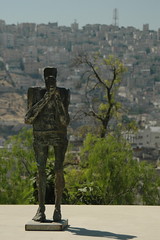
We visited a new art gallery called Darat el Funuun in the Jebel el Webdeh neighborhood, then went to the Roman citadel overlooking downtown, then the Roman amphitheater and baths in the heart of downtown. We had lunch at a well-known traditional downtown restaurant called Mata’am el Quds (Jerusalem Restaurant) and dinner at a trendy new place run by the Royal Society for the Conservation of Nature, which is doing great things around the country.
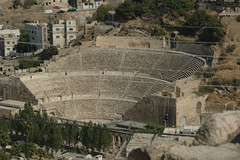
As we walked around Amman, Ghazi made a great hit with the local people. If they spoke to him or made eye contact, he would say “Es salamu 'alekum,” (Peace be upon you), which has a distinctly Muslim quality, as opposed to the more secular “Marhaba” (hi) or “Sabah / Mesa el kheir” (Good morning / evening). The young kids would shout out to Ghazi occasionally with such questions as “How you make your hair?!?” He seemed entertained.
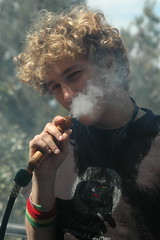
Observation of someone passing through: the new American Embassy in Amman appears to me to be the size of the entire North Campus of UB. That could be off by a few inches, but it is truly an imposing presence. Then there are the surrounding fortifications and tanks, the rerouted traffic, and the interdiction of all photography. The conclusion one reaches is that the US is hugely committed to an enduring and imposing presence in this country. I’m not clear that such a spectacular enormity in the middle of their country sends a comfortable message to the Jordanians, or makes it particularly easy to develop relationships with the people that are not under the shadow of the fortress.
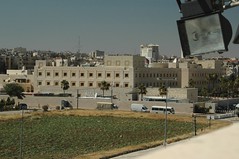
Second observation: the rumors of King Hussein’s demise are greatly exaggerated. He seems to be revered in death even more than in life. Most interesting are the numerous and highly visible posters showing King Hussein with his arm fondly draped around the neck of his son and successor, King Abdullah: two regular guys, in casual clothes, smiling out at the people. The intent here -- love me, love my son -- could not be more obvious, but I wondered aloud to Jordanian friends whether the current king’s legitimacy seemed to require shoring up. I was told that there had been many contenders to the throne, including quite a few who, unlike the victor, actually spoke Arabic without a foreign accent (!). (See here for a discussion of the complexities.) But the consensus seemed to be that King Abdullah had earned the respect of his people during these first few years. Apparently he decided that Jordan would be neutral in the Iraq-US war, and the slogan for this posture, surely a Madison Avenue creation, was “Jordan first!”
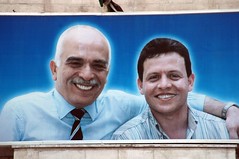
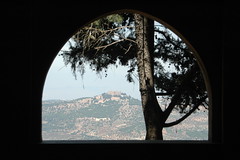
By our second full day in Jordan, Ghazi was feeling Saladdin’s revenge pretty acutely, and had to be Immodiumized. Speaking of the Crusaders’ nemesis, we traveled on Friday to Ajloun, site of a Crusader-era castle, through Jerash, for a gathering of chamber music enthusiasts. The views, the food, and the music were all very nice and the orientation was cosmopolitan and somewhat Western: “Ghazi, you don’t say ‘Es salamu 'alekum,’ you say ‘hi.’” On Saturday, Ghazi bravely boarded the Jett bus from Amman’s Abdaly station. By an hour later, I was in a service (=group taxi) headed for Beirut via Damascus. More on that trip in the next installment.

1 Comments:
What a great travelogue. I hope Ghazi if feeling better and that he's enjoying his time.
Keep the notes and pictures coming. Both are great. Trips to S.C. beaches are going to seem boring now.
Post a Comment
<< Home